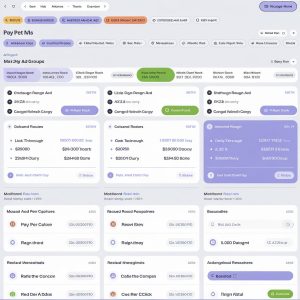In 2024, the digital marketing agency landscape is rapidly transforming, driven by advancements in technology, shifting consumer behavior, and new regulatory measures. Staying ahead of these trends is critical for marketers who want to remain competitive and relevant. Below, we explore the most influential digital marketing trends that will shape the industry in 2024, providing insights and actionable strategies to implement them successfully.
1. AI-Driven Personalization and Content Creation
Artificial Intelligence (AI) has reshaped the way brands communicate with their audiences. With AI-powered tools, marketers can create highly personalized experiences, leveraging data to deliver targeted content that aligns with individual preferences.
AI in digital marketing spans from automated content creation to enhanced customer support. For instance, tools like ChatGPT and DALL-E allow marketers to generate engaging content at scale, significantly reducing time and cost. AI-driven analytics also help marketers predict user behavior, tailoring marketing strategies that increase engagement and conversion.
Actionable Strategy: Invest in AI-powered tools for content generation, predictive analytics, and customer segmentation. Ensure your team is trained in using these tools effectively to create more personalized user experiences.
2. Voice Search Optimization
With the rise of smart speakers and voice-activated assistants, voice search has become a vital channel for reaching consumers. By 2024, it’s estimated that nearly 50% of all online searches will be voice-based, making it crucial for brands to adapt their SEO strategies to accommodate this change.
Voice searches are typically longer and more conversational, often involving questions and location-based queries. Optimizing for voice search means using natural language, focusing on question-based keywords, and ensuring your content is well-structured for featured snippets.
Actionable Strategy: Optimize your website for voice search by incorporating long-tail keywords, conversational phrases, and creating FAQ pages. Ensure your Google My Business listing is updated to enhance your visibility in local voice searches.
3. Short-Form Video Content Domination
Platforms like TikTok, Instagram Reels, and YouTube Shorts have solidified the dominance of short-form video content. This type of content appeals to today’s consumers, who have shorter attention spans and prefer quick, engaging, and easily consumable videos. In 2024, brands will need to integrate short-form video content into their digital marketing strategies to maintain audience engagement.
Short-form videos offer an opportunity to connect with audiences on an emotional level, showcase brand personality, and convey complex information in a digestible way. Brands that embrace storytelling through these videos can build a loyal audience and foster brand trust.
Actionable Strategy: Develop a short-form video content plan that aligns with your brand values. Experiment with different formats, including behind-the-scenes looks, product tutorials, and user-generated content (UGC), to find what resonates best with your audience.
4. Influencer Marketing 2.0: Niche and Micro-Influencers
Influencer marketing continues to grow, but the focus is shifting from high-follower influencers to niche and micro-influencers. Brands are partnering with these influencers to target specific audiences more authentically, as they typically have a higher engagement rate and a stronger connection with their followers.
By working with micro-influencers, brands can leverage niche communities and build trust with audiences who value authenticity over follower counts. As a result, brands can achieve higher returns on investment (ROI) without the high costs associated with major influencers.
Actionable Strategy: Identify micro-influencers within your industry who align with your brand. Use influencer platforms or manually research Instagram, YouTube, or TikTok to find the right partners. Focus on creating long-term partnerships that foster trust and drive engagement.
5. Privacy-First Marketing and First-Party Data Collection
As privacy concerns grow, consumers are becoming more cautious about their data, and governments are implementing stricter data regulations. In 2024, privacy-first marketing will become essential, with brands prioritizing transparency, consent, and the ethical handling of data.
With the impending phase-out of third-party cookies, marketers must focus on collecting first-party data, such as email addresses, purchase histories, and website behavior. This shift means that brands need to establish stronger direct relationships with their audiences and find new ways to gather valuable insights.
Actionable Strategy: Focus on building trust with customers through transparent data practices. Implement strategies like email sign-ups, loyalty programs, and surveys to gather first-party data. Ensure your marketing team is updated on data privacy laws such as GDPR and CCPA to maintain compliance.
6. Interactive and Immersive Content
To capture consumer attention, marketers are turning to interactive and immersive content such as quizzes, polls, augmented reality (AR), and virtual reality (VR) experiences. These formats enhance engagement by allowing users to participate actively rather than passively consuming content.
In 2024, brands can utilize AR for virtual try-ons in the fashion and beauty industries or VR to create virtual tours for real estate, travel, and other sectors. Interactive content improves user experience, keeps visitors on the website longer, and can lead to higher conversion rates.
Actionable Strategy: Incorporate interactive content on your website and social media channels. Experiment with AR filters on Instagram or Facebook, create quizzes to engage users, or use VR to provide unique brand experiences. Tailor these elements to meet the interests of your target audience.
7. Sustainability and Social Responsibility Marketing
Consumers are increasingly valuing brands that are committed to social and environmental causes. In 2024, sustainability and social responsibility will play a more significant role in digital marketing strategies, as brands communicate their commitment to ethical practices and sustainability initiatives.
Brands that prioritize transparency about their environmental impact, labor practices, and other ethical considerations can build stronger relationships with consumers. This approach attracts socially conscious customers and fosters brand loyalty.
Actionable Strategy: Highlight your brand’s sustainability efforts in your marketing materials. Showcase eco-friendly practices, charitable initiatives, and transparent supply chains. Use social media to amplify these messages and connect with consumers who share similar values.
8. Enhanced Customer Experience with Conversational Marketing
Conversational marketing, using AI-driven chatbots and messaging apps, is revolutionizing how brands interact with customers. These tools allow for real-time engagement, personalized responses, and quick resolution of queries, improving overall customer satisfaction.
With advancements in AI, chatbots are becoming more sophisticated, handling complex queries and delivering human-like interactions. In 2024, brands will increasingly use conversational marketing to enhance the customer journey, create personalized experiences, and collect valuable insights for further personalization.
Actionable Strategy: Implement AI-driven chatbots on your website or use messaging apps like WhatsApp or Facebook Messenger for customer support. Design your chatbots to be as human-like as possible and focus on personalization to improve customer engagement and satisfaction.
9. Predictive Analytics for Proactive Marketing
Predictive analytics enables marketers to forecast trends and behaviors, allowing for more proactive and strategic decision-making. This trend will continue to grow in 2024 as marketers use data to anticipate customer needs and personalize marketing efforts.
By analyzing past data and leveraging machine learning, predictive analytics helps brands identify patterns, optimize campaigns, and allocate resources effectively. This approach can lead to increased ROI and a better understanding of customer preferences.
Actionable Strategy: Invest in predictive analytics tools and incorporate them into your marketing strategy. Use these insights to plan targeted campaigns, create customized product recommendations, and improve customer segmentation for enhanced personalization.
10. The Rise of Zero-Click Content
As Google continues to refine its search algorithms, zero-click content is on the rise. Zero-click searches are those where users get the answers they need directly on the search engine results page (SERP) without clicking on a link. For marketers, this means creating content that not only ranks but also provides quick, direct answers.
To leverage this trend, brands must focus on optimizing content for featured snippets, creating concise and informative content, and using structured data. This ensures that they remain visible in search engines even if users do not click through to their site.
Actionable Strategy: Structure your content to answer questions succinctly, and use schema markup to increase your chances of appearing in featured snippets. Optimize for FAQ-type content and provide concise answers to common questions in your industry.
Final Thoughts
As 2024 unfolds, the digital marketing landscape will continue to evolve, offering both challenges and opportunities. By staying on top of these trends—embracing AI, optimizing for new search behaviors, investing in video and interactive content, and prioritizing privacy—marketers can adapt and thrive in this dynamic environment. Understanding and implementing these trends can lead to more effective campaigns, better customer engagement, and, ultimately, a stronger market position.
Adapting to these trends early on will ensure that your brand remains competitive, relevant, and well-positioned for continued growth in the ever-evolving digital landscape.











